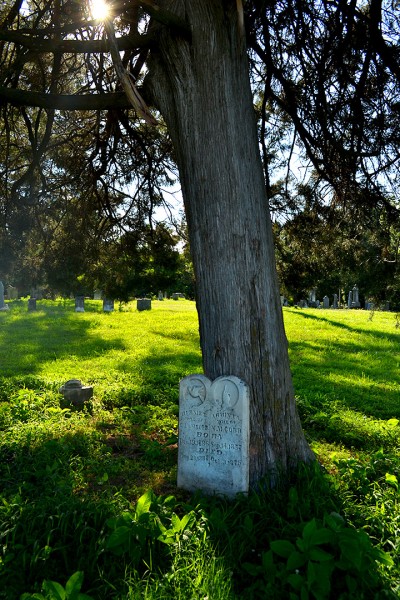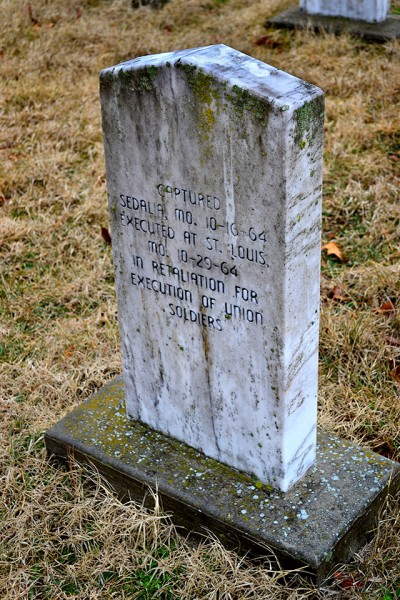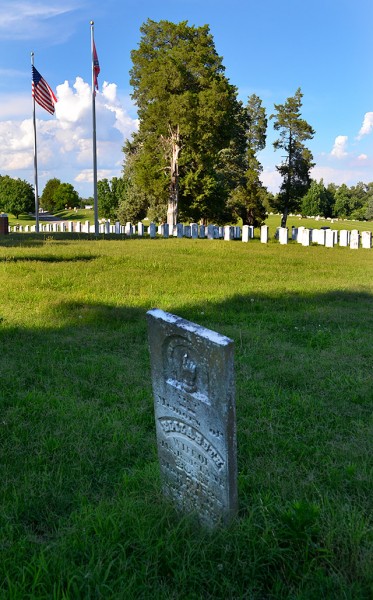 Whenever visitors come to town, I drag them down to the Stoddard County Confederate Memorial in Bloomfield. The unique thing about this memorial is each stone tells how the soldier died.
Whenever visitors come to town, I drag them down to the Stoddard County Confederate Memorial in Bloomfield. The unique thing about this memorial is each stone tells how the soldier died.
Veterans Day is be a good time to examine the plight of a Stoddard county soldier who came to a sad end. In a way, it tells a lot about how the Civil War was fought in Missouri. For more detail, go to The Asa Ladd Story. It’s worth a read.
Asa Valentine Ladd
 Asa Valentine Ladd, a farmer, enlisted in the Confederate army March 10, 1861, in Stoddard County. He took with him two horses and left behind a wife, Amy, and seven children. He served a mostly undistinguished military career and was involved in no general engagements. He was captured in Sedalia Oct. 16, 1864.
Asa Valentine Ladd, a farmer, enlisted in the Confederate army March 10, 1861, in Stoddard County. He took with him two horses and left behind a wife, Amy, and seven children. He served a mostly undistinguished military career and was involved in no general engagements. He was captured in Sedalia Oct. 16, 1864.
In a separate fight – The Battle of Pilot Knob, near Bloomfield in September 1864 – and having no connection with Pvt. Ladd, a Union Major, James Wilson and six of his men were captured by the Confederates. They were turned over to CSA Major Tim Reeves, called a guerrilla by the Union Forces. It has never been determined who gave the order, but Major Wilson was taken out and hung and his men were shot. When word of this murder reached Gen. Rosecrans, who was commanding the Department of the Missouri, he issued a retaliatory order to the effect that a Major and six enlisted men of the Rebel captives be shot.
Men were forced to draw lots
 Prisoners were given the option to take the Oath of Allegiance to the Federal Government. Those who complied were paroled. Those who refused, including Pvt. Ladd, were marched into a room where they drew lots. A container of black and white marbles was held above eye level and the men were told to take a marble. Six black marbles meant death; a white marble won the soldier a parole. Pvt. Ladd drew a black marble.
Prisoners were given the option to take the Oath of Allegiance to the Federal Government. Those who complied were paroled. Those who refused, including Pvt. Ladd, were marched into a room where they drew lots. A container of black and white marbles was held above eye level and the men were told to take a marble. Six black marbles meant death; a white marble won the soldier a parole. Pvt. Ladd drew a black marble.
Letter to his wife
 Pvt. Ladd wrote this moving letter in the last hours of his life:
Pvt. Ladd wrote this moving letter in the last hours of his life:
Dear Wife and Children:
I take my pen with trembling hand to inform you that I will be shot between 2 and 4 o’clock this evening.I have but a few hours to remain in this unfriendly world. There is six of us sentenced to die because of the six Union soldiers that were shot by Reeve’s men. My dear wife, don’t grieve for me.I want you to meet me in Heaven. I want you to teach the children piety, so that they may meet me at the right hand of God.I can’t tell you my feelings but you can form some idea of my feelings when you hear of my fate.I don’t want you to let this bear on your mind anymore than you can help, for you are now left to take care of my dear children. Tell them to remember their dear father. I want you to tell my friends that I have gone home to rest.
I want you to go to Mr. Connor and tell him to assist you in winding up your business. If he is not there, get Mr Cleveland. If you don’t get this letter before St. Francis River gets up, you had better stay there until you can make a crop, and you can go in the dry season. It is now past 4 a.m. I must bring my letter to a close, leaving you in the hands of God. I send you my best love and respects in the hour of death. Kiss all the children for me. You need have no uneasiness about my future state, for my faith is well founded…
Good-by Amy,
Acey Ladd
She never got the letter
 Amy, it is said, never got the letter, particularly the part that warned her to wait out high waters on the St. Francis River. She loaded two wagons, hitched up the oxen to them and hired a man to drive one while she drove the other. One of the wagons tipped over crossing the flooding river and all its cargo, including the family Bible, was washed away. She ended up raising her children in Arkansas without ever seeing her husband’s last words.
Amy, it is said, never got the letter, particularly the part that warned her to wait out high waters on the St. Francis River. She loaded two wagons, hitched up the oxen to them and hired a man to drive one while she drove the other. One of the wagons tipped over crossing the flooding river and all its cargo, including the family Bible, was washed away. She ended up raising her children in Arkansas without ever seeing her husband’s last words.
A man who deserved killing
 It’s easy to paint the confederate Major Reeves as the bad guy in this story, but the Major James Wilson he killed, according to some accounts, was “a heartless Union officer with a take no prisoner policy. He and his troops rode into Ripley Co. on Chrismas day of 1863 and killed 35 solders and 62 civilians, some as young as 12 months old, while they were eating Christmas dinner.”
It’s easy to paint the confederate Major Reeves as the bad guy in this story, but the Major James Wilson he killed, according to some accounts, was “a heartless Union officer with a take no prisoner policy. He and his troops rode into Ripley Co. on Chrismas day of 1863 and killed 35 solders and 62 civilians, some as young as 12 months old, while they were eating Christmas dinner.”
From the book Shelby and His Men: “The execution of Major Wilson at Pilot Knob was an act of eminent justice, for he was a common murderer, and entirely destitute of manly and soldierly feeling.”
Rank has privileges
What happened to Major E.O. Wolf who was supposed to be shot along with the other five soldiers? He received a stay of execution.
John M. Ferguson, who had drawn a fatal black marble, was determined to have been a teamster and had served as a soldier only a short period of time. His name was stricken from the roll of death to be replaced by George F. Bunch. Ferguson, it was said, “was so rejoiced and grateful at this unexpected deliverance, that he shed tears and declared that hereafter he would fight only for the Union.”
Charles W. Minniken asked to say a few words before the sentence was carried out: “Soldiers, and all of you who hear me, take warning from me. I have been a Confederate soldier four years, and I have served my country faithfully. I am now to be shot for what other men have done, that I had no hand in, and know nothing about. I never was a guerilla, and I am sorry to be shot for what I had nothing to do with, and that I am not guilty of. When I took a prisoner I always treated him kindly and never harmed a man after he surrendered. I hope God will take me to his bosom when I am dead. 0, Lord be with me!” While a sergeant was tying his blindfold, Minniken said: “Sergeant, I don’t blame you. I hope we will meet in heaven. Boys, when you kill me, kill me dead.”
And, that was the messy way the Civil War was fought in Missouri. As Jim Denny wrote in The War Within the State, “Missourians did not have to await the arrival of an invading army to begin making war – they just chose sides and began fighting each other.”
